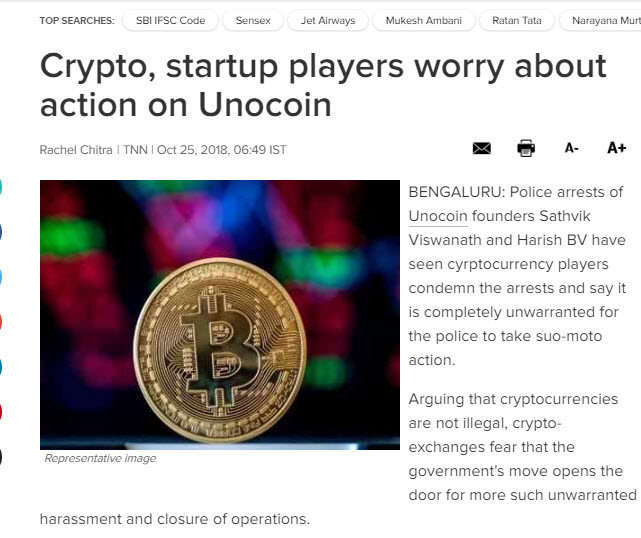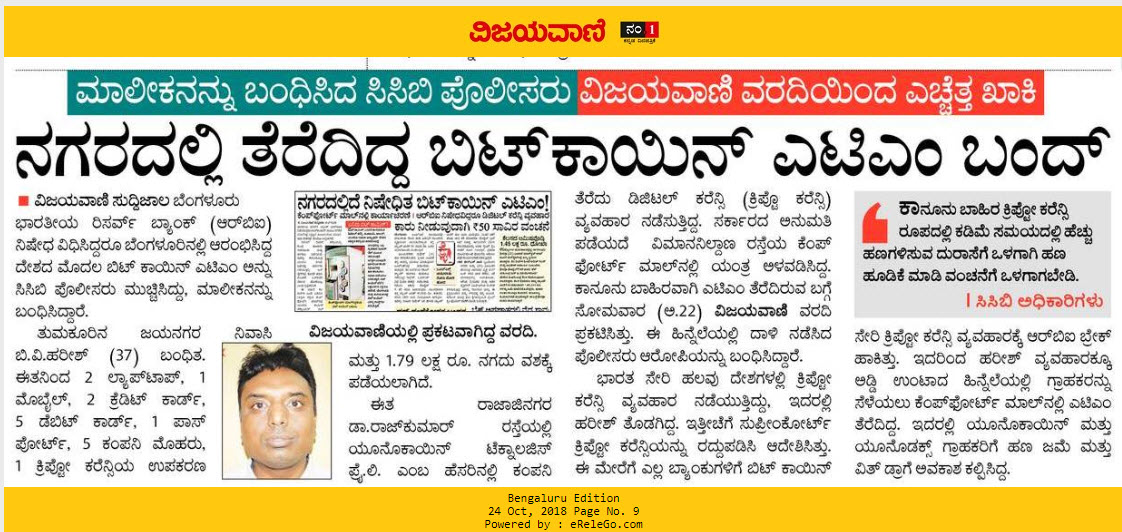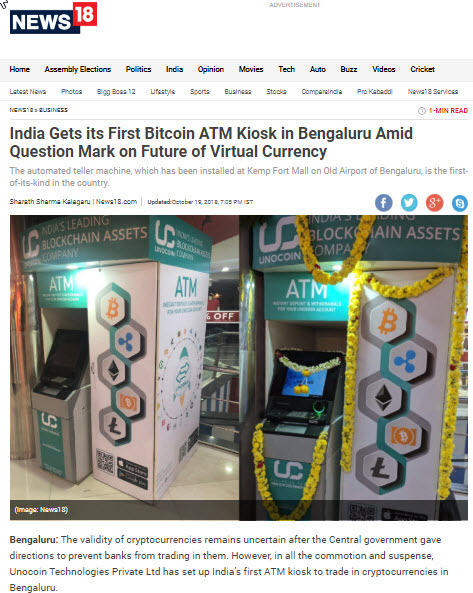
Last week, there was a news report that a Bitcoin ATM has become operational in Bangalore. It was hailed as “first of its kind” in the country and will have both a “Trading” and “Exchange” platform. The purpose of the ATM is to buy and sell Bitcoins against rupees.
The proposition is,
If you deposit Rs 5,26 463/- (rate prevailing on unocoin.com as of today) and additionally, a transaction fee of Rs 3686.90 and service tax Rs 663.64, one Bitcoin would be credited to the digital account of the person.
On the other hand, if you surrender one Bitcoin from your digital BTC wallet, you would get Rs 4,33,016 in cash after again deducting the transaction fee and service charges.
The difference between the basic buying and selling rate is Rs 93,447/- per bitcoin which is 21.58% is the jobber’s margin charged by Unocoin which is running the exchange.
The Company Unocoin also separately makes a profit of Rs 7373.80 as transaction fee. When Unocoin sells Bitcoins from its own stock, it makes the additional Rs 93447/- for itself.
If the seller of Bitcoin is a different person, then he sells and realizes Rs 4,33,016. The buyer pays Rs 526 463/-. One wonders where the balance goes. Will there be negotiations between the seller and buyer to arrive at a median price? Or will Unocoin offer to buy and sell simultaneously and pocket the difference?… are questions that need to be answered.
Since in most cases the Unocoin acts as a “jobber”, it will perhaps hold the sell order in it’s control until a “Buy” order emerges and then puts through the transactions crediting the difference to its own jobbing account. It may even use a separate digital wallet which could for all practical purposes be a dummy wallet to route the transaction. It is for this reason that the ATM is called both a trading and an exchange platform. If it is an exchange, then the transaction is between the buyer or seller with a jobber. If it is a trading platform then both the transaction should be between the buyer and seller directly.
The Kiosk also allows transactions in Ethereum crypto which is bought and sold at the rate of rs 21,343 and Rs 15,314 (Spread Rs 6029/- which is 39.36% of the base price).
It is a great business model for the Company and we must appreciate the innovative structuring of the business model to offload the Bitcoins that may be in stock with the Company before the Government really bans all transactions in Bitcoins.
Since RBI does not allow linking of Bitcoin exchanges to Bank accounts, both the buying and selling has to take place in Cash only. Hence the ATM has to accept and dispense cash only and credit or debit the digital Bitcoin wallet with the Unocoin.
People who are aware of Foreign Exchange transactions and share transactions have heard of a spread of 0.5% to 3% and not 20% plus. But people who are aware of money laundering are aware of and prepared to pay upwards of 25% for converting black money to white money. The brokerage/jobber’s commission charged by this Bitcoin ATM therefore is perfectly acceptable as the fee for conversion of Black money to white money. I am not aware of what is the “Havala” broker’s charges for such transactions. But I suppose it would not be less than 25%. It should be more than the Black money to white money conversion rate since there is an additional service of conversion to foreign exchange is involved.
According to the information available (perhaps through an official press release from the company), the ATM which is also referred to as Kiosk so that the customers and law enforcement agencies can be confused about whether Bitcoin is being traded as a currency or a commodity. The information also quotes the Finance Minister Mr Arun Jaitely as quoting that Crypto currency is “neither legal nor illegal”. The Minister is projected as if he is recommending “Investment” in Bitcoin. Last year during this time, there was a full page Times of India advertisement urging the investors to “Invest in Bitcoin during this Diwali instead of Gold”. Perhaps this ATM is being set up for the festival season trading of Bitcoins.
The transaction of conversion of Bitcoin to rupee is done on INR basis but the release says that the INR can be converted into foreign currency later. Does it mean that Unocoin also works as an “Authorized Dealer” in foreign exchange? or has roped in willing Authorized Dealers to provide the conversion of INR to foreign exchange and ViceVersa?.. More clarity is required on this aspect.
The point on which the ATM company is arguing the legality of the ATM is that the transactions are allowed only for the customers of the Unocoin and the registration is through a mobile number and an OTP. The members are expected to provide the PAN number, address and phone number. The verification would however be on the mobile and perhaps it would not be possible for Uncoin to find out if the PAN number is actually correct and whether the address and name as registered for PAN would identify with the mobile used for OTP. More clarity is required on this.
In totality, it appears that this ATM is a means of converting unaccounted cash in INR into bitcoins and then the Bitcoins can be traded on other exchanges (including those who have fled from India to safer havens recently) to convert the Bitcoins to US dollars or other currencies and again brought back to India as INR in legit inward remittances.
Similarly, Foreign money of criminals and others can be converted into Bitcoins in foreign exchanges into bitcoins and then traded in this ATM using fake SIM card based authentication and fake accounts into INR and paid out in cash.
This ATM is therefore a Virtual Havala Center and regulatory authorities need to explain how they are allowing this to happen. How can there be a Service Tax registration for such an operation which indirectly creates a perception of legitimacy.
The Service tax department becomes an accomplice in this Havala transaction by being a co-beneficiary of the transaction and we need the department to explain this.
The Bangalore Police also has to explain under what provisions they have ignored the potential of this service to be a havala operation and why they have allowed this ATM to be set up.
The owners of the Kemp Fort Mall have to also explain why they should not be considered as an accomplice in this potential havala operation.
I hope these agencies make a public clarification on the grounds under which this ATM has been allowed to operate or be prepared to be considered as facilitating the operations.
Naavi
Reference Articles in Naavi.org on Bitcoin
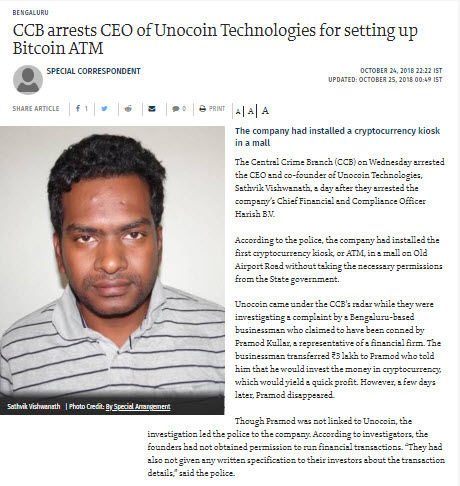 Harsih a few days back. It is unfortunate that the company Unocoin and it’s promoters find themselves in this predicament.
Harsih a few days back. It is unfortunate that the company Unocoin and it’s promoters find themselves in this predicament.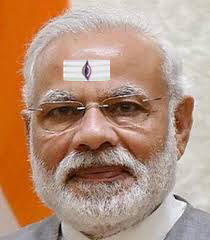 ment institution without sparing even Mr Modi. We are therefore happy that at last the Bangalore Police acted when they were challenged
ment institution without sparing even Mr Modi. We are therefore happy that at last the Bangalore Police acted when they were challenged  with the ATM concept.
with the ATM concept.
